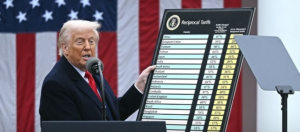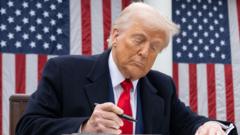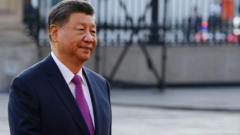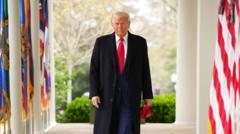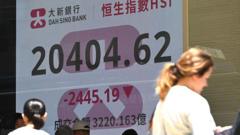South Korea's stock and currency markets face significant declines as investors respond to President Yoon Suk Yeol's controversial martial law declaration, with government officials pledging extensive support to stabilize the economy in the face of mounting political chaos.
South Korea's Political Crisis: Markets React to Martial Law Declaration

South Korea's Political Crisis: Markets React to Martial Law Declaration
As political uncertainty looms, South Korea's markets experience volatility following the government's brief martial law declaration.
In recent developments, South Korea has encountered a surge of political turbulence following President Yoon Suk Yeol's brief declaration of martial law, prompting concerns among investors and analysts alike. On Wednesday morning, the benchmark Kospi index dropped by around 2 percent, reflecting unease among traders. Major companies like Samsung Electronics and LG Energy Solution saw declines exceeding 1 and 2 percent, respectively.
Initially declared late Tuesday night, the martial law was lifted shortly thereafter. The South Korean won also witnessed fluctuations, trading down approximately 1 percent against the dollar following the announcement. In response to the financial turmoil, Finance Minister Choi Sang-mok convened discussions with the central bank and key financial regulators, ensuring a daily communication pipeline to assess risks and provide “unlimited liquidity support” for stabilizing markets.
Amidst demands from opposition lawmakers for Yoon's resignation, analysts predict that this period of political unrest could have long-lasting effects on market, consumer, and business sentiment. Min Joo Kang, a senior economist at ING, drew comparisons to the 2017 presidential impeachment, suggesting that sentiment might take a considerable hit.
While concerns about South Korea's credit rating linger, uncertainty precludes definitive conclusions regarding its implications. Notably, Krishna Guha, vice chairman of Evercore ISI, remarked on the resilience of the nation's democratic institutions, foreseeing minimal disruptions to business operations despite the extraordinary circumstances.
Meanwhile, other Asia-Pacific markets remained relatively stable, with benchmark indexes in Japan, Australia, and Hong Kong experiencing minor declines of under 1 percent. With the South Korean government emphasizing its commitment to economic integrity, the outcomes of this crisis remain to be seen as the nation navigates through tumultuous political waters.
Initially declared late Tuesday night, the martial law was lifted shortly thereafter. The South Korean won also witnessed fluctuations, trading down approximately 1 percent against the dollar following the announcement. In response to the financial turmoil, Finance Minister Choi Sang-mok convened discussions with the central bank and key financial regulators, ensuring a daily communication pipeline to assess risks and provide “unlimited liquidity support” for stabilizing markets.
Amidst demands from opposition lawmakers for Yoon's resignation, analysts predict that this period of political unrest could have long-lasting effects on market, consumer, and business sentiment. Min Joo Kang, a senior economist at ING, drew comparisons to the 2017 presidential impeachment, suggesting that sentiment might take a considerable hit.
While concerns about South Korea's credit rating linger, uncertainty precludes definitive conclusions regarding its implications. Notably, Krishna Guha, vice chairman of Evercore ISI, remarked on the resilience of the nation's democratic institutions, foreseeing minimal disruptions to business operations despite the extraordinary circumstances.
Meanwhile, other Asia-Pacific markets remained relatively stable, with benchmark indexes in Japan, Australia, and Hong Kong experiencing minor declines of under 1 percent. With the South Korean government emphasizing its commitment to economic integrity, the outcomes of this crisis remain to be seen as the nation navigates through tumultuous political waters.

